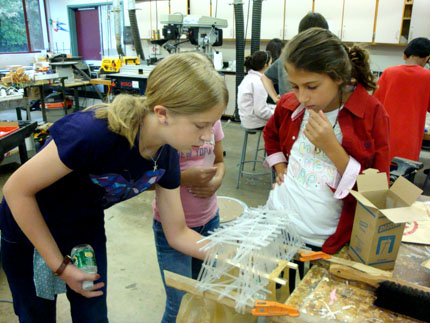Weston Middle School
Technology/Engineering Course Materials
Excerpted From AAAS Project 2061- Science Literacy for All by George D. Nelson(1999) . Educational Leadership, October 1999 - Volume 57 - Number 2
A New Approach to Teaching
Project 2061's work has also brought attention to the growing body of
research about the nature of learning and teaching when science literacy
is the goal. Consider the assertion in Science for All Americans, for
example, that "learning is not necessarily an outcome of teaching."
Cognitive research reveals that even with good instruction, many students--including
academically talented ones--understand less than we think that they do.
For example, although students taking an examination may be able to identify
what they have been told or what they have read, careful probing by teachers
often shows that students' understanding is limited or distorted, if not
altogether wrong. This finding suggests that parsimony is essential in
setting out educational goals: Schools should pick and emphasize
the most important concepts and skills so that they can concentrate on
the quality of understanding rather than on the quantity of information
presented.
In a classroom where science literacy is the goal, teaching should take its time. In learning science, students need time for exploring, making observations, taking wrong turns, testing ideas, and doing things over; time for building things, calibrating instruments, collecting things, and constructing physical and mathematical models for testing ideas; time for learning whatever mathematics, technology, and science they need to deal with the questions at hand; time for asking around, reading, and arguing; time for wrestling with unfamiliar and counterintuitive ideas and for coming to see the advantage in thinking differently.
Moreover,
any topic in science, mathematics, or technology that is taught in only
a single lesson or unit is unlikely to leave a trace by the end of schooling.
To take hold and mature, concepts must not be presented to students just
from time to time, but must be offered to them periodically in different
contexts and at increasing levels of sophistication...."
Mass DOE White Paper-21st Century Skills
